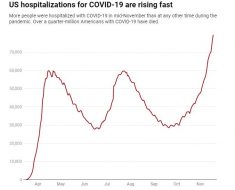As coronavirus disease (COVID-19) spreads globally, emerging new variants of severe acute respiratory syndrome coronavirus 2 (SARS-CoV-2) pose a threat to ongoing vaccination efforts. One of these new variants, the United Kingdom variant or the B.1.1.7 variant, has now reached many countries and has contributed to skyrocketing cases.
Now, researchers at the University of Exeter, the NHS Foundation Trust, report a significant increase in mortality risk due to the B.1.1.7 severe acute respiratory syndrome coronavirus 2 (SARS-CoV-2) variant.
Also known as the United Kingdom variant, the B.1.1.7 variant first emerged in September 2020. From there, it has spread to many countries, including the United States.
In the study, published in The British Medical Journal (BMJ), the team investigated epidemiological signatures tied to the B.1.1.7 variant, including its reproduction number, presentation, and outcome by S-gene status.
The team aimed to establish any change in mortality from infection with the B.1.1.7 variant compared with other circulating SARS-CoV-2 variants.
.jpg)
Increased mortality
To arrive at the study findings, the team estimated the SARS-CoV-2 reproduction number in the United Kingdom by using Public Health England's data in March 2020, contributing to the Scientific Pandemic Influenza Modeling subgroup (SPI-M) weekly consensus estimates.
When the new variant was reported in December 2020, SPI-M research groups shared data, allowing them to identify the infections. From there, the London School of Hygiene and Tropical Medicine (LSHTM) used the data to develop estimates of the variant's increased transmissibility.
In January 2021, the team showed an analysis showing a worrying rise in deaths associated with the B.1.1.7 variant.
In the current study, the researchers wanted to see if there is indeed an increased risk of mortality tied to the new variant. They utilized a matched cohort study method, a method used to estimate vaccine efficacy, which has been applied for the Meningitis B vaccine.
In this method, the participants are paired with equivalents, depending on various characteristics.
To arrive at the study findings, the team obtained data from 54,906 matched pairs of participants who tested positive for SARS-CoV-2 between October 1, 2020, and January 29, 2021, followed up until February 12, 2021.
Once the researchers had decided on a study design, within hours, preliminary estimates showed a significant increase in mortality risk due to the B.1.1.7 variant. They found that the mortality hazard ratio linked to infection with the B.1.1.7 variant was 1.64 compared with infection with previously circulating variants in people with COVID-19 in the community.
There is an increase in deaths from 2.5 to 4.1 per 1,000 detected cases in the same group.
The researchers' estimates were even higher than that of the LSHTM estimates. The two findings were combined with the forecast and analysis of researchers from the Imperial College, which involved admissions data from Scotland.
Further, the team found that the risk of death is elevated by infection with the new variant. They added that the new variant could cause additional mortality compared to previously circulating variants.
"Healthcare capacity planning and national and international control policies are all impacted by this finding, with increased mortality lending weight to the argument that further coordinated and stringent measures are justified to reduce deaths from SARS-CoV-2," the researchers noted in the study.
The team urged that future work exploring factors like geographical location, time, age, sex, ethnicity, and deprivation is essential to pave the way for better targeting of resource allocation, relaxation of restrictions, and vaccine distribution strategies.
Also, they plan to communicate their findings to healthcare decision-makers quickly. The study findings can help health experts decide on proper mitigation measures to prevent the virus's further spread.
To date, more than 123.5 million SARS-CoV-2 infections have been recorded worldwide. Of these, 2.72 million people have died, and over 70 million have recovered.
The United States reports the highest number of cases, reaching 29.85 million, followed by Brazil with 11.99 million, India with 11.64 million, Russia with 4.41 million, France with 4.35 million, and the United Kingdom with 4.31 million cases.
- COVID-19 Dashboard by the Center for Systems Science and Engineering (CSSE) at Johns Hopkins University (JHU) – https://gisanddata.maps.arcgis.com/apps/opsdashboard/index.html#/bda7594740fd40299423467b48e9ecf6
- Challen, R., Brooks-Pollock, E., Read, J., Dyson, L., and Tsaneva-Atanasova, K. (2021). Risk of mortality in patients infected with SARS-CoV-2 variant of concern 202012/1: matched cohort study. The British Medical Journal (BMJ). https://www.bmj.com/content/372/bmj.n579
Posted in: Medical Research News | Disease/Infection News
Tags: Coronavirus, Coronavirus Disease COVID-19, Efficacy, Gene, Healthcare, Hygiene, Influenza, Medicine, Meningitis, Mortality, Pandemic, Public Health, Reproduction, Research, Respiratory, SARS, SARS-CoV-2, Severe Acute Respiratory, Severe Acute Respiratory Syndrome, Syndrome, Vaccine, Virus

Written by
Angela Betsaida B. Laguipo
Angela is a nurse by profession and a writer by heart. She graduated with honors (Cum Laude) for her Bachelor of Nursing degree at the University of Baguio, Philippines. She is currently completing her Master's Degree where she specialized in Maternal and Child Nursing and worked as a clinical instructor and educator in the School of Nursing at the University of Baguio.
Source: Read Full Article





